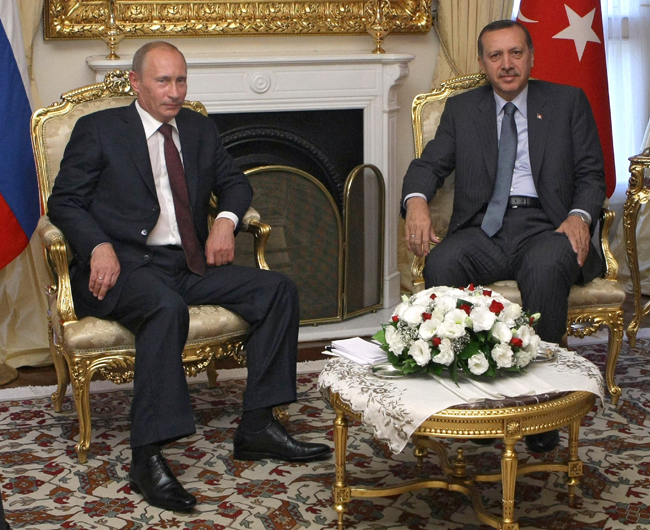
Ankara Explores Turkish-Russian Consortium to Construct Nuclear Power Plant
Publication: Eurasia Daily Monitor Volume: 6 Issue: 161
By:

Russian Prime Minister Vladimir Putin’s August 6 visit to Ankara for talks with his Turkish counterpart Recep Tayyip Erdogan secured some twenty agreements covering energy, trade and other fields. Consequently, Ankara has made its most immediate priority to lift the regulation requiring the full inspection of Turkish goods at customs gates. Russia put strict procedures in place against Turkish exporters in August 2008. The implementation of those rules, combined with the impact of the global economic crisis, caused Turkish exports to Russia to fall by 58 percent in 2009 (Today’s Zaman, August 20). However, Moscow prioritized Turkey’s first nuclear power plant tender, which was awarded to a Russian-Turkish consortium. As the original price was too high, the tender has long awaited cabinet approval. Meanwhile, the Russian side lowered the price, and offered a compromise (EDM, August 7).
Regarding easing the inspection of Turkish goods at customs, the Turkish state minister Hayati Yazici revealed that, "Russian authorities have annulled the regulation requiring the full inspection of Turkish goods at customs gates" (Hurriyet Daily News, August 19). Given that the Russians have long conducted full inspection of Turkish goods since 2008, the decision to annul the regulation will have greater implications beyond Turkish-Russian trade in textile or agriculture.
Knowing that Russia insists on involvement in the nuclear power plant construction, its decision to ease restrictions on Turkish goods may well be related to Ankara’s decision to find a new way of helping the Turkish-Russian consortium. Regarding the tender, Energy and Natural Resources Minister Taner Yildiz has stated he is dissatisfied with the price submitted by the Turkish-Russian consortium in January -a bid of 21.16 cents per kilowatt hour (kwh), adjusted to 15.35 cents in early February in an attempt to prevent its bid from collapsing.
It seems that, despite its dissatisfaction, Ankara is exploring ways to reduce the price of nuclear energy. Recently, Yildiz said that the Turkish state could take as much as a 25 percent-stake in the plant if the company lowers the price (Hurriyet, August 8). The suggestion, however, drew intense criticism, since it was not included in the original bid specifications. Meanwhile, the media has raised questions over whether modifying the financial terms will amount to unfair competition, as other companies might have wanted to participate under such conditions.
Yildiz insists on the issue of the Turkish state share. In response to continued criticism he responded: "Let us examine the issue either from a proactive or pragmatic perspective. If the public share, whether it is 15 percent or 25 percent and whether it is at the beginning or at the end of the tender, is causing the price to fall, it is an important factor. If some risks are to be eliminated with the public share, then I have to adopt it for the sake of my country’s interests" (Today’s Zaman, August 20).
Yildiz has long advocated a public share in nuclear energy. As early as 2007 he suggested that private companies are averse to investing in nuclear energy without having a certain level of public share. He believes that it is necessary for inexpensive energy prices (www.globalenerji.com.tr, July 2007).
Since Yildiz became the energy minister, he has attempted to insert the public share into the nuclear energy bidding process. Energy experts interpret his public share argument as an attempt to lower the price by reducing the risk to the Turkish-Russian consortium bid (Milliyet, August 14). The major obstacle, however, is the Turkish judiciary, which would not allow changing the pre-existing conditions of the bidding process in order to reduce to cost of nuclear energy. In addition to their ideological opposition to the AKP government, most of these judges have a tendency to oppose nuclear energy. Yildiz, on the other hand, argues that a public share is legal, and that it is unnecessary to cancel the bidding process if the public share is considered as a way of reducing the price of nuclear energy (Hurriyet, August 20).
Analyzing the strategies of the Turkish company Park Energy -a company which won the nuclear energy bid, wants to maintain good relations with the AKP government, and uses its media outlets to fully support its domestic and foreign policies- indicates that the bid might succeed. Unless rival companies, which initially wanted to enter the bidding process but because of high risk factors withdrew, generate international and domestic support against the "public share," it is likely that the Turkish-Russian company will be declared as the final winner in the bidding process.




